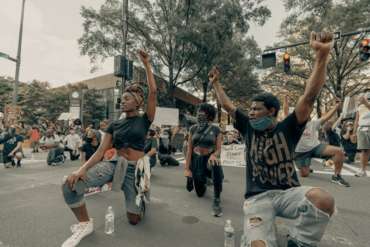As the COVID-19 pandemic looms, protests for justice and accountability grow, and an election nears, Americans are at odds over which has more power – the talk or the walk.
We are in crisis. As I write this article, instances of racial violence and racist threats toward Black people in America flood social and news media channels. There are public, peaceful protests against the injustices against Blacks happening in at least 30 cities.
During non-violent protests, white “allies” and other parties have engaged in vandalism and looting, inciting wide-ranging and often disproportionate police violence. Several cities are burning, while Covid-19 continues to rage throughout the country, hitting minority communities the hardest.
And it’s an election year, so what are we going to do?
It’s a lot easier to talk about doing the right thing than to actually do it, but that never stopped anyone from being all talk and no action. And by “talk,” historically it has meant literal words coming out of ones fingertips as well as your mouth.
Everyone talks about what they should do. They talk even more about what everyone else should do. The irony is, the more we talk about what we should be doing, the less we seem to do about it.
Clearly, talking is viewed as a substitute for doing. It’s not — not even a little.
Imagine how empowered you will feel when you stop talking about what you’re going to do and take action on actually getting things done!
According to Brian Smith, et al (2019)’s article Beyond Slacktivism: Examining the Entanglement between Social Media Engagement, Empowerment, and Participation in Activism, the connection between engagement and activism for communication is tricky. “Although social media facilitates protests, it may also create a lazy form of activism known as slacktivism, potentially weakening the strength of any movement.”
Given the distancing demands of the current times, some prominent voices have opted to sit back and host talkfests that do little to actually address what’s going on with action. Groups like the NAACP, NAN, and the president himself are all hosting virtual conversations on well-known issues but the actions, if any, that follow are flat and meaningless.
From COVID conversations to Politics and *insert breakfast or brunch food item here* to Coping & Culture lectures there’s a wide-ranging landscape of talk to participate in, but what’s the end goal?
The Center for Disease Control advocates that we stay 6 feet apart and wear masks as to not transmit the coronavirus to each other. However, we can still affect real change with these limitations.
According to Eddo-Lodge, “It reveals the anxieties, hypocrisies and double standards of whiteness. It is a problem in the psyche of whiteness that white people must take responsibility to solve.” So how do you get white to solve problems when we’re urged to isolate and wait for further instructions?
YouGov’s latest research shows that there is a significant divide between black Americans and the rest of the country about whether or not people talk too much about racial issues. Most white people (57%) and half of Hispanics (49%) think that people talk too much about racial issues. Among black Americans, however, only 18% think that people talk too much about racial issues while 49% think we talk too little about racial issues. Only 18% of white Americans think that Americans do not talk enough about racial issues.
White Democrats are divided between those who think we talk too much (33%) and too little (32%) about racial issues, but large majorities of white independents (60%) and white Republicans (77%) think we talk too much about racial issues.
With political campaigns rolling out socially distant canvasses and virtual events to write letters or meet with elected officials, there are opportunities to meet your neighbors or community partners to put action to words.
Many colleges and universities have been quick to close campuses and pivot to online instruction. In doing so, many have revealed the gaps in our safety net and higher education policies, stressed the challenges vulnerable students face, and left some students to come together and fend for themselves.
The time has passed for lengthy conversations on health and future as it relates to the coronavirus and life post-covid. We need solutions and action oriented outcomes. With big names opting for more talk out of fear or complacency and community activists opting for grassroots methods, where do you stand? What can you and your organization do in your community? What would promote equity and justice and activate meaningful change?
Racism isn’t just Black people’s problem; it’s everyone’s problem because it erodes the fabric of society. Leaders at every level must use their power, platforms, and resources to help individuals and communities overcome these challenges and build a better world for us all.

